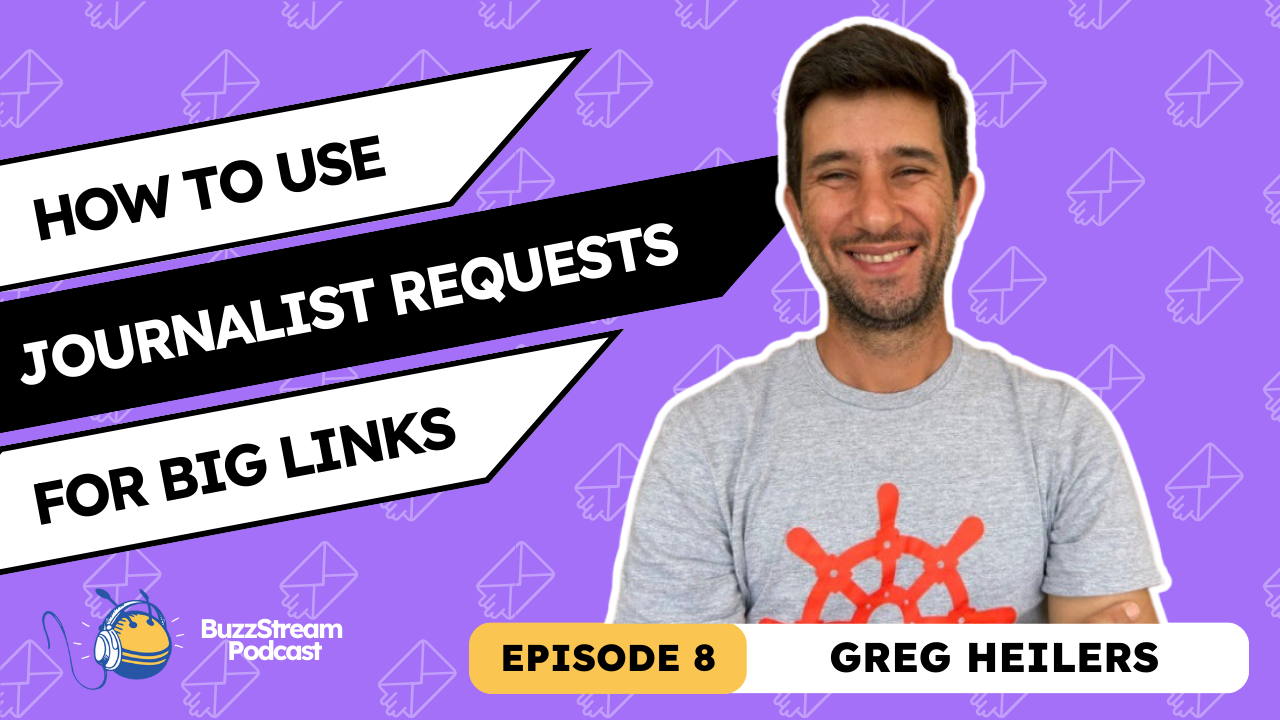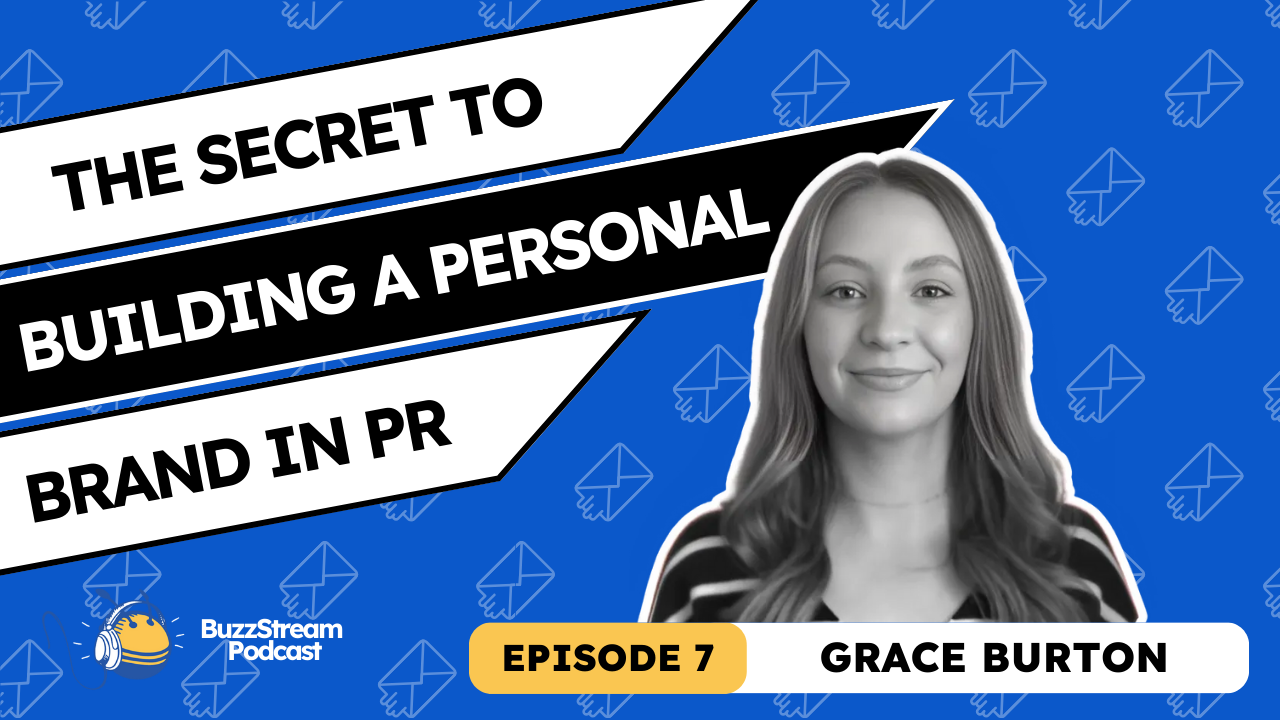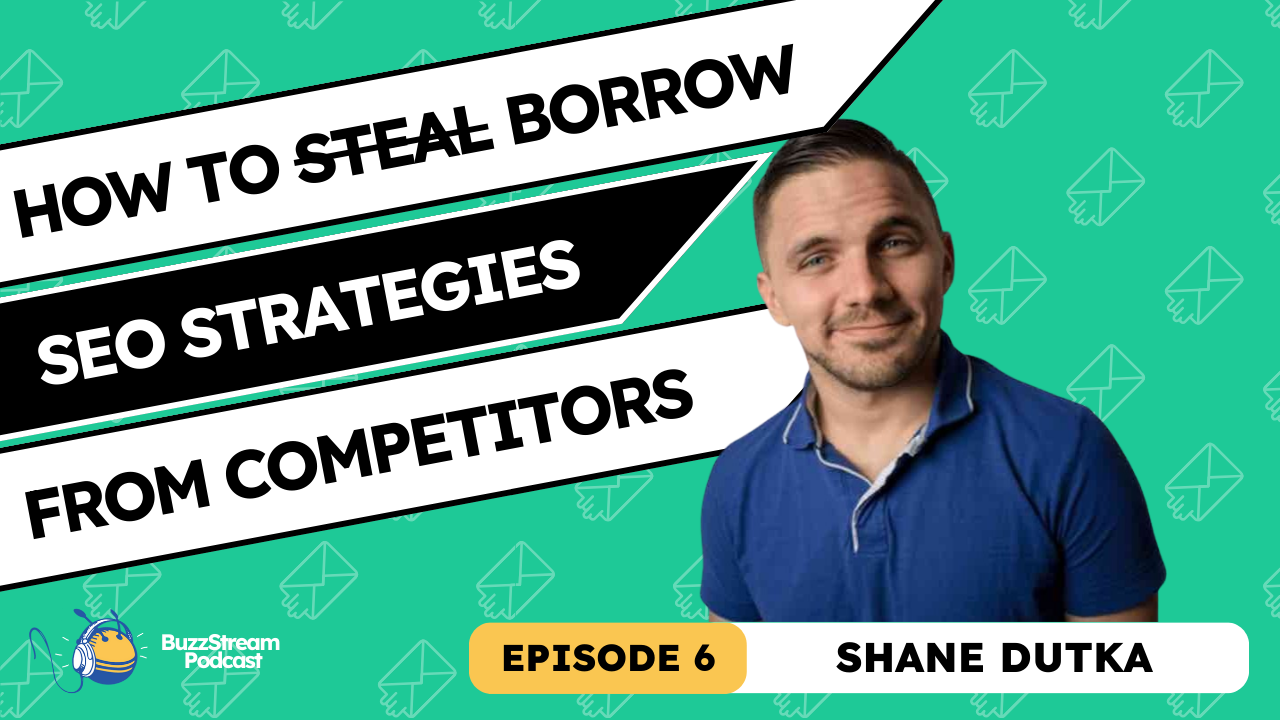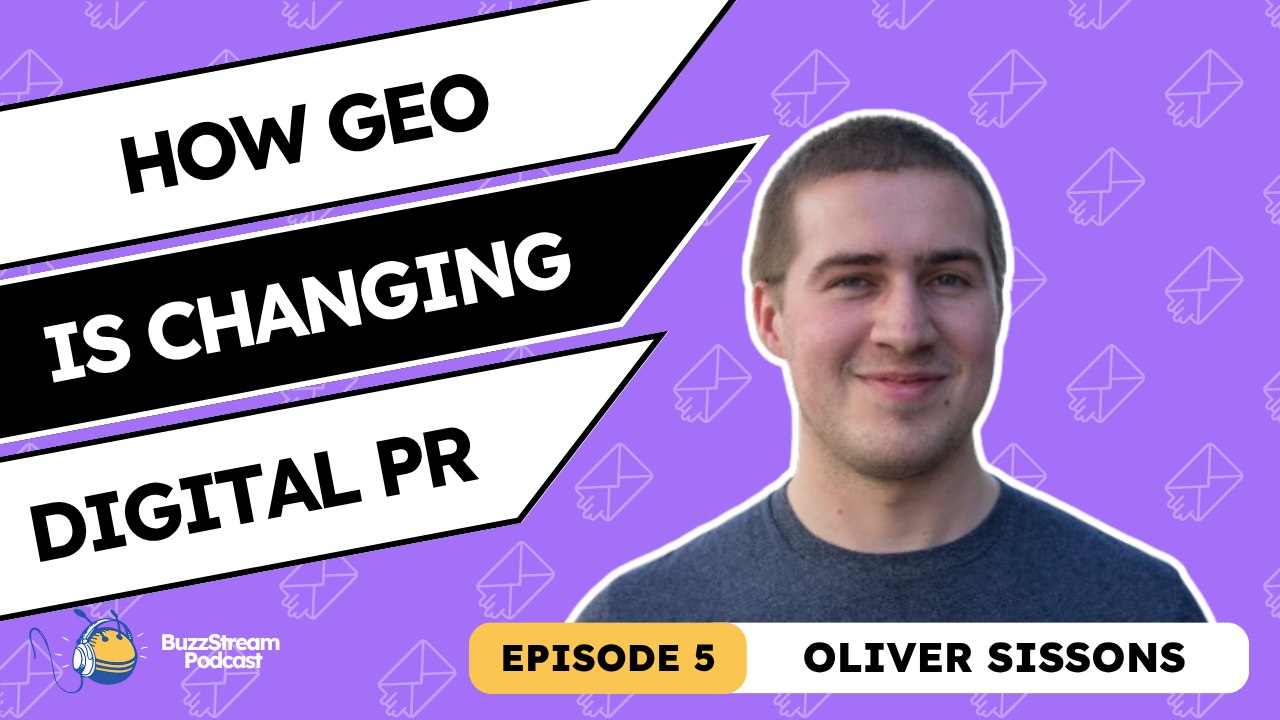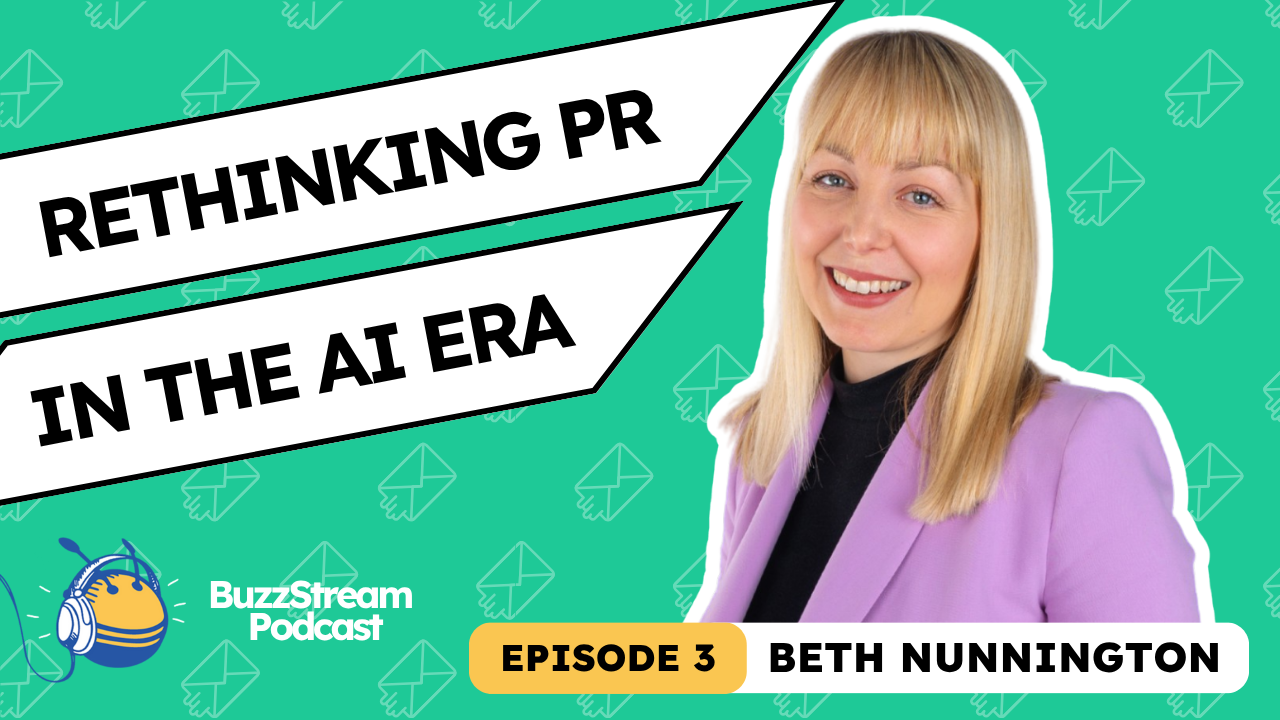Table of Contents
HARO—or Connectively—is dead. Long live Source of Sources!
Peter Shankman, the creator of the original HARO, was fed up with what they did to his product after he sold it.
So, he started up Source of Sources. (In my opinion the best alternative to HARO/Connectively.)
Once Connectively announced they were closing the doors on Dec. 9, I emailed Peter to get him on our pod.
He said yes immediately because, as you’ll see, he’s a very open guy. He wants people to succeed in PR. (But not if you’re spamming his tool. You don’t want to become enemies with Peter.)
In this episode, Peter briefly overviews his journey, his Faster Than Normal podcast, but the meat of the discussion is how to get the most out of his new resource.
Buckle up for a great conversation about pitching and earning coverage with Source of Sources.

How to Succeed with Source of Sources
As always, here are some actionable takeaways from the podcast. Based on my chat with Peter, here is exactly how you can get coverage from Source of Sources.
1. Stay Relevant and Respect the Platform’s Rules
The number one rule seems to be to avoid irrelevant pitches.
This is what destroyed HARO.
Peter is very upfront about that and has systems to remove you if you spam his platform easily (and quickly).
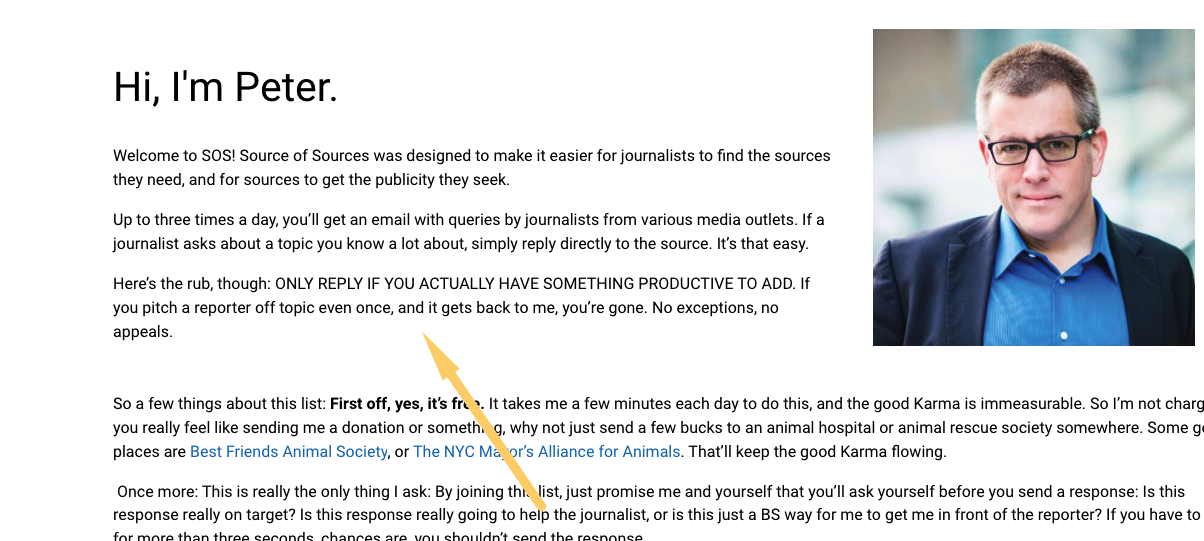
Journalists report off-topic pitches all the time.
2. Have a Pitch Ready to Go
Prepare a pitch template that you can quickly customize for specific queries.
Act fast—respond within the first 10 minutes of a published query to increase your chances of success.
Peter recommends setting up email alerts. (He even said in the podcast that some PRs set morning alarms based on his emails.
AM emails come out just after 6:00 AM EST.
PM emails come out just after 1 PM EST.
3. Focus on Brevity
Keep pitches short: three paragraphs maximum.
The structure is essentially:
- Greet the journalist and reference their query.
- Briefly describe your expertise and how you can help.
- Provide contact information and wrap up.
That’s really all you need.
4. Avoid AI-generated Pitches
Journalists can easily identify pitches written by AI.
AI should only be used to refine and strengthen your writing, not to create it from scratch.
5. It’s Fine to Respond on Behalf of Clients
There’s no reason you can’t respond on behalf of a client. Journalists don’t care as long as the information is good.
But if you represent a client, don’t wait for their approval or response. Instead, get pre-approval on language to ensure accuracy and speed.
6. Wait For the Right Opportunities
Avoid the “shotgun approach”; instead, aim for precision and relevance.
You can also research journalists’ past work to understand their style and preferred topics.
Source of Sources integrates with MuckRack to access journalist profiles and their recent articles directly. Then, set up alerts for yourself when they send requests.
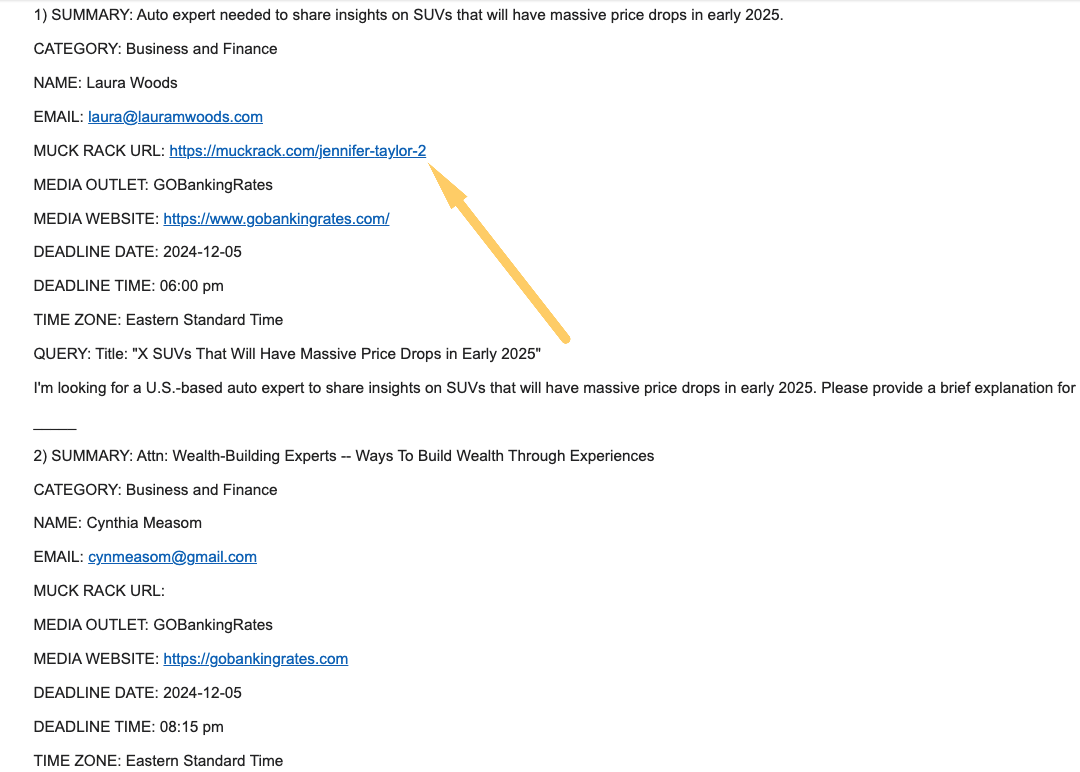
(Note: Not all journalists have MuckRack profiles.)
Transcript
As always, here’s the full (slightly edited) transcript of our talk.
Why did you ultimately decide to restart HARO as Source of Sources?
Peter: I didn’t want to.
I really didn’t want to.
I saw what Cision had been doing to HARO, or not doing to HARO, and really bummed me out.
I qas really sad that they sort of let it die.
They weren’t monitoring it.
It had turned into a shitty AI platform where everyone was sending out AI pitches, where spam farms were primarily using it, and SEO farms out of Southeast Asia and India and, and, the Mideast to just drive reporters crazy.
No reporters that I knew were using it anymore.
The journalists that were using it were very tiny blogs and very small outlets.
But again, I sold it 14 years ago.
We can’t go home again. Right?
It wasn’t, it wasn’t my thing anymore, whatever they did to it, they did to it.
And then I just kept getting emails from people, and they said, “Hey, did you know they, they, they turned HARO to some app called Connectively and it, and finally I just got pissed off.
I’m like, well, this is bullshit.
And like most things I do, I did in a hurry and I did them. I did it with absolutely no plan as to what I was going to do.
And within 20 minutes I had a website built and within.
Another hour after that I’d announced it and we had 16,000 members within a day.
We’re now at just over 30,000 members. Over 2,000 journalists have used it and counting. They’re all coming.
We have about a 100 percent retention rate on journalists.
They’re, they’re all coming back. Um, and then HARO shut down. And again, I mean, you know, Cision, the company that bought HARO, well, the couple of hours Vocus, Vocus was acquired, turned into Cision and then Cision was acquired by private equity.
And as we all know, nothing good comes out of being acquired by private equity.
Red lobster didn’t go bankrupt because too many people were eating too much fucking shrimp.
They went bankrupt because they were acquired by private equity, right?
Malls didn’t die because Amazon malls got acquired by private equity. So, you know, I saw the writing on the wall. I’m scared the hell with this.
And, and SOS blew up.
And like I said, we’re at 30,000 members now, uh, Cision immediately tried to sue me.
And now they’re dead. But, you know, there’s a great family guy episode where, Peter’s at a funeral and one of his wife’s aunts or something. And, she goes, “yeah, she never really liked you, Peter.”
And Peter goes, “nd now she’s dead.”
Knock yourselves out guys. You know, he’s dead.
So, you know, my whole premise is there is a place for journalists and sources to connect.
It doesn’t need to cost money. I know there are other companies out there. I know there’s Qwoted, which is like 10 grand a year is some bullshit, right?
If you are a small business, you don’t have 10 grand a year to spend on PR.
If you did, you’d have an agency.
Number two, spending 10 grand a year for the chance of getting press. The chance of getting coverage is one hell of a spend.
Especially since you have to do all the work. We’re free. We’ve always been free. That’s the purpose behind Helper Reporter and behind SOS now.
I never wanted to charge. I never wanted to make it, uh, I never wanted to make money that way.
I don’t believe that a membership subscription service or something like Qwoted is worth it, especially because all the journalists using Qwoted are using SOS now. They might still be using Qwoted. Why not?
You know, you have multiple options. That’s how I started HARO.
PR Newswire threatened to sue me when I launched HARO because they had something called ProfNet.
And the journalists that were posting on ProfNet heard about HARO and started posting on HARO. And, I remember it was the only PR Newswire called me, this was like probably 2007, the one day in my life, the only day in my life I’d ever taken a Percocet.
Because I had a broken rib. And the doctor gave me a Percocet, I thought it was a fuckin aspirin, right, I took it and like five minutes later, I’m like, ooooh.
And the phone rings and it’s PR Newswire, and they’re threatening to sue me because reporters are using HARO.
And they’re like, well, we sent out a query on Profnet, and we saw it on your little email list the same day.
I’m like, well, if a journalist sends me the same query, they send you, and we both post them, how am I stealing your queries?
And then the progress I kicked in, right? So I said, Oh my God, if you’re a newswire, you’re like totally stealing my query.
Stop that. Oh, it’s hystorical.
And I told them like, guys, look, I have, at the time I had like 300 members on my mailing list.
Buy me a steak and a martini and I’ll give them to you. Right?
I’m not doing this to make money. Then we all know how that ended. HARO was sold for millions of dollars to a company that’s now dead.
And so they could have gotten it a lot cheaper, but so it’s kind of the same premise.
It’s like there are a hundred million small businesses out there, right? A lot of whom are, especially in this current economy and where we’re going politically, are going to be paying more taxes, subsisting on, you know, profit margin to be thin as anything.
They shouldn’t have to pay to level the playing field for public relations opportunities.
And if SOS can do that, just like how I did, there’s absolutely no reason not to, and there’s no reason not to join it.
My issue, and it was the same issue with HARO, I don’t; my biggest growth is not a hindrance, but my biggest goal for growth is not to steal the X number of hundreds of agencies that are paying for Qwoted or paying for whatever.
My goal is the 67 million small businesses in the country that have not yet heard of SOS and do not know that there is a free way to get.
So that’s kind of where I’m going, and I’m having fun with it. And, you know, I’m massively ADHD. This was not my goal to run another company.
I already run two of them, right? This is the third company I’m now running. And, I run a company called Mental Capital, which, which teaches giant companies like Morgan Stanley and Google how to attract, hire and retain neurodiverse employees while becoming neuroinclusive.
I’m a corporate keynote speaker.
I’ve written six books and two New York Times bestsellers.
I’m a single dad. I have shit to do. I didn’t want to do this. And here we are.
Is Source of Sources only for US journalists and PRs right now?
Peter: No, it’s, it’s international. Any, any reporters that want to use it? Any, any journalists want to use it?
Anyone want to sign up? I’m more than welcome to do anything they want.
What does the breakdown look like?
Peter: We are about 68 percent, small businesses, about 32 percent agency. And it is about 82%. I believe it was last time I checked a couple of weeks ago, 82 percent US.
The rest is, international overseas.
And here’s the thing. I know this show gears primarily towards SEO and things like that. And then HARO. Because it wasn’t monitored, it turned into an SEO platform, right?
Where people could look for those sweet, sweet back links. I get that.
And here’s my thing. And I’ll come out and say it.
I have no problem with SEO firms using SOS to generate backlinks.
If they don’t do it in a shitty way, if they are, if they are scanning the queries and replying to every single journalist with an AI-generated pitch, I will find you. And I will ban you.
There are several, I’m really good, but I’m sure if you’re an SEO, I’m sure, you know, um, you know, uh, empire flippers, right?
I am really good friends with the guys at Empire Flippers.
One guy who’s not an Empire Flippers but runs a small business and SEO search firm out of Bangkok did exactly that.
He used my site; everything was generated AI. He tried to hide his email address. And so I Googled the name. That led me down a rabbit hole, and I eventually found out, “Oh look, he has an account on Empire Flippers.”
I called my friend, who’s the CEO of Empire Flippers, and said, I need this guy killed. And it, they didn’t basically kill him. I can’t say they did, but he and the entire, like, 20 people who outsource work for him are no longer there. Their entire IP block is banned.
And I have zero problems doing that.
Right? And I monitor this shit because it’s mine. Right. HARO wasn’t monitored after I sold it because they didn’t care.
I care. Do it right.
Pitch what matters to the journalists.
Give the journalists information that’s on topic and on point.
Stay as long as you’d like, fuck with me. And you’re going to find out.
How are you monitoring spam and keeping it under wraps?
Peter: I have a forensic technologist who is, who works for me on call.
I can send him. I could send him, I swear to God, I could send him IP addresses and email headers that I’ve made up, that I’ve literally pulled out of my ass, and he will find someone who they’re attached to.
I can only imagine he sits in a very dark basement and drinks. Like a lot of jolt cola, if that’s still a thing, but he, he gets it done. Like no one I’ve ever met.
And, and yeah, he will find these people and they will be gone.
Vince: So you’d see that on HARO all the time. I used to use Harrell on both sides of the, You know, the coin as someone looking for experts and you’re asking for someone, you know, who’s an expert in roofing or something, and you get, Oh, you know, we’re an experts in plumbing, but you know, it’s close enough, or we’re experts in construction or whatever.
How do you deal with agencies pitching irrelevant pitches?
Peter: Not only do we monitor it, but if the reporter emails me and says, “Hey, this guy was pitching off-topic.” They don’t get a second chance, right? The older I get, the more I realized that life is just too good. I’m short to give second chances to everyone. So when you sign up, the rules are very simple.
They’re literally in your face. They say, Hey, don’t pitch off-topic.
I mean, it doesn’t get much easier than that. I could print it in other languages, but it’s literally right there.
Vince: Yeah. Yeah. I love that. All right. Let’s get into. Kind of probably the most important piece of this, and you, you emailed me, shared some of your tips for securing coverage.
Let’s, let’s go over that a bit more here. They were, they were pretty short and sweet, but I’d like to get your take on it.
What are your main tips for securing coverage?
Peter: Yeah, I mean, the basic premise is have a pitch ready to go that you can simply fill in the blanks for.
You want to be able to have a pitch ready to go because when the email goes out at 545 in the morning, I know people who set their alarms or their email app to set off their alarm when the specific SOS email comes in.
Because that’s how they wake up on the East Coast and they look at it and they can respond immediately.
Because if you’re responding late, I guarantee you the reporter’s got the replies ready.
It’s the first 10 minutes of that query going out that will get you what you need. Anything after that you’re probably already too late.
So that’s number one number.
Number two focus on brevity.
Brevity has to rule the day. Three paragraphs, max.
Hi. I saw your query on this. Here’s what my company does Here’s how here’s what I can talk about. Here’s how to contact me. Thank you. Bye
Um, if they are interested, they will get back to you. So that’s number two.
And let’s see, number three, again, don’t use AI.
It’s so obvious. I still don’t understand how people can’t tell when AI is used.
It’s, it’s like the people who believe that, that, that, that AI is indistinguishable from human-written words, I assume are the same people who believe the prostitute that tells them that she likes them.
So, yeah, at the end of the day, I am pretty easy.
Those rules are pretty easy.
Just follow them and you will get press.
I literally landed on Good Morning America this morning from an SOS query. (I occasionally answer my own queries.) They wanted to know about any parents who find themselves having to learn a whole new language because their generation’s alpha kids.
And I said, yes, my daughter uses words like “suss” and “goat” and, and, and “skibbidy”.
And it’s very frightening to me, and I think she’s possessed, and I jokingly sent the reply, and I was in Good Morning America today.
So it’s those kinds of things, right? It really does work. And our, our journalists are growing by the day.
On a regular basis we have USA Today, Forbes, L. A. Times, New York Times, Wall Street Journal, New York Times Sunday, New York Post, Atlanta Journal Constitution, CBS News, Money Watch, PBS… they’re just growing and growing and growing.
I’m looking at the number of queries that have come in since this morning.
Huffington Post, Resilient Stories Authority Magazine, Next Avenue PBS, Luxury International, Parade Magazine, Newsday, Jewish Journal of Los Angeles, Yahoo Health, The Information Week, Medium, Marketing Sherpa, and we were at 27 new queries since this morning.
And it’s 10, 10, seven on the East coast.
Vince: Okay. Kind of a specific question. I know this kind of comes up a lot in the way that a lot of agencies work and utilize a source of sources or utilize tarot. So you’re an agency representing a client, right? Like you have a bunch of different clients. You want to try to use Source of Sources. Do you recommend responding on behalf of the client?
If you represent a client, do you recommend responding on behalf of them?
Peter: Yes. Waiting for the client to respond is going to be way too late. Use clear verbiage that the client has already approved.
Do journalists mind if you are an agency?
Peter: No, not at all. As long as you have the source they’re looking for, they’re fine with it.
And they’re going to vet you anyway.
They’re going to vet you anyway. So, you know, on the off chance that, that you’re full of shit, they’re going to find out long before they do it anyway.
Vince: Okay, so that, yeah, that was kind of my, my follow up question is. Say you’re a super small website, right? Like, you know, you’re, you’re local plumber or something.
Do they want you? Does it matter how well known you are?
Does it matter how big of a site or how well-known you are?
Peter: If you have the answer they’re looking for, and again, they’re going to, they’re going to check on you. Journalists have gotten a lot smarter. They’re not going just to take anyone to face value anymore. They’re going to look you up, right?
It’s never been easier to figure out if this guy’s full of shit, if this guy’s real, if this guy’s fake; they’re going to look you up and, assuming you have the credits to back you up, yeah, they’re going to use it.
They don’t care that you work for a small company. Some of the smartest people in the world I’ve ever met work very, very local.
I have a guy who did my cabinets. He works literally in Manhattan, and that’s it.
And he’s making a fortune because he’s some of the best in the industry.
And he always gets calls from these Upper East Side old women. Like, if you redo my cabinet, like 50,000 a shot, you’re making a fortune.
You don’t need to be huge.
Vince: Uh, um, all right, Peter, do you think AI has a role in this at all? Yeah, it
Does AI have a role in this at all?
Peter: It does. It makes a good writer a better writer, but it’s not going to make a shitty writer a good writer.
Write your pitch and give it to chat. It can be ChatGPT or Claude or whatever and say, “Hey, strengthen this.”
Yeah, that’s the best thing you can do.
I virtually strengthen virtually everything I write.
It does it well, but “write me a pitch about whatever” is going to be crap.
Write it yourself. And it’s literally like getting another pair of eyes to look at your thing before you send it out. That’s all.
Vince: Yeah. I love that. I talk about AI as kind of like a buddy, a brainstorming buddy.
Peter: You would never go to your editor and say, “Hey, I have this article. Can you write it for me?”
You’d write the article and say, Hey, can you check this out?
Vince: Yeah. Yeah. All right. The last thing I wanted to kind of really make sure I wrap my head around is this idea of pre-writing quotes or so that you can kind of fill in the blanks.
Say, I own a cabinetry site or something. Do you recommend brainstorming through what kinds of things journalists are going to be asking about in this industry?
How do you respond to the journalist?
Peter: The best thing you could do is to look at what the journalists have written about in the past and the kind of writing they do. Most of the freelancers write for five or six different outlets.
It shouldn’t be that hard to find, to Google their name and find out what they’re writing about, especially because HARO didn’t do this.
But SOS does.
On SOS, we have a partnership now with MuckRack.
MuckRack has Dossiers on tens of thousands of journalists when they use our system. Theri dossier is automatically attached to the query, right?
I’m looking at one right now from John Edwards, who is ready for Information Week. He’s at MuckRack.com/John-Edwards-4.
You’re going to find everything he’s written the past six months literally right in front of you.
No one else has that that partnership with my brackets exclusive to S. O. S.
Vince: Yeah, that’s exciting. Uh, that’s, that’s newer, right?
Peter: About four months ago. Yeah.
Vince: Yeah. Yeah. Sorry. Let me rephrase my question. So, uh, this, this idea of speed and being able to get this quote out. You kind of said earlier that you like filling in the blanks, right?
So you’re not necessarily prewriting the full quote, but you’re prewriting part of it.
That that’s the part I wanted to wrap my head around a bit kind of. Like, what tips do you have for people to prepare this stuff kind of so that when the time comes.
Do you recommend people pre-write quotes for journalists?
Peter: I mean, look, you’re looking for very specific answers.
You’re looking for very specific media outlets.
They’re going to benefit your client or benefit you.
They’re looking for very specific quotes from very specific sources.
So, the more specific you are, the better chance you have.
The shotgun approach doesn’t work. It doesn’t work in PR, and it certainly doesn’t work, with SOS.
You want to be very, very specific.
We look at it and think about it as niching, right?
You want to have that niche that you own and that you are great at.
You can then send it to a reporter and say, “Hey, this fits me perfectly. Here’s why ABC.”
Got it.
Vince: So you’re looking for a very specific niche that you can fit into.
It’s like when you, uh, are looking for a house or something, you know, the neighborhood and as soon as that house goes on the market, boom, you’re going to go for it.
Peter: Yeah.
Well, Peter, this has been awesome. I, you know, I feel like I got everything answered that I wanted to. Still, before we go, I’d love to hear a little bit about your podcast and give people listeners a chance to understand kind of what you do outside of Source of Sources and the Faster Than Normal Podcast sounds like such a fantastic thing.
I’d love to give you a chance to talk about that a little bit.
Can you tell us more about the Faster Than Normal Podcast?
Peter: Yeah. So Faster Than Normal is one of my things.
So I was diagnosed with massive ADHD, probably about 10 years ago.
And prior to that, I just grew up being told that I’m different. Shut up.
I grew up in public school in New York City and public school in the 80s and 70s and 80s, ADHD didn’t exist.
What existed was, “sit down, you’re disrupting the class.”
And so I was, uh, told that I was broken.
I was told it was different.
So let’s say, so I’ve learned to do things differently that worked my, my differences to the best of my ability.
And that wound up leading to virtually all of my success.
So that sort of led me to realize, wow, everyone’s calling ADHD a deficit, but I actually see this as a gift that led to my doing research on it.
After I got divorced, I’m like, how come I can start to sell companies for millions, but I can’t like, you know, make my marriage work or, you know, remember birthdays?
So I started really sort of understanding why I always have to speak out or why can’t I just shut up.
And so that led to Faster Than Normal.
And, I’m still not a doctor, but the things I do in my life are designed a certain way because of how my brain is, and I felt like sharing that with people.
So, Faster Than Normal was a New York Times bestseller, it still is.
So, still doing that, and, um, I’ve started a podcast called Faster Than Normal.
Same thing, about over 300 episodes.
Some people all over the world who understand that that ADHD is a gift to the point where I’m— one of my biggest badge of honor —was that I got banned from the ADHD subreddit on Reddit.
They do not believe it’s a gift; they believe it’s a terrible disease.
I came in all happy about it.
Now, anytime someone brings up my book or brings me up, they get a warning, which I think is fucking awesome.
So yeah, I absolutely love that I got banned; I didn’t even say anything, like I just said, “yeah, I look at it as a gift; here’s the book I wrote.”
They were like “No, no, it’s not a gift, it’s a curse.”
All right, you know, stay small guys.
I just, I think it’s hysterical. So I’m having a lot of fun with it.
So I do that and still speak on customer experience and customer service.
Then, you know, more than anything else, I’m a single dad, to an 11 year old kid, and she’s, she’s pretty awesome.
And we have a lot of fun. That’s my story.
Vince: That’s fantastic. And you’re learning about rizz. Well, Peter, this has been great. Really. Thanks for coming on. I know you’re a busy guy.
Where can people find you? Where can people connect to you if, if they are interested in, in learning more about Faster Than Normal?
Peter: My entire life’s at petershankman.com.
My email is Peter shankman.com. I respond to all my emails.
I’m not allowed to do my own calendar. My assistant took that away from me about 15 years ago because I screwed up and scheduled two groups on the same night on separate continents.
And she just said, either you give me your calendar or I’m quitting.
So I haven’t had calendar access.
I can see what’s on my calendar, but I can’t actually add anything, but I do answer any emails.
And, um, yeah, fasterthannormal.com is the podcast.
Sourceofsources.com is the free newsletter.
I’m at Peter Shankman on all the socials except Twitter because, because fuck Elon.

 End-to-end outreach workflow
End-to-end outreach workflow



 Check out the BuzzStream Podcast
Check out the BuzzStream Podcast

